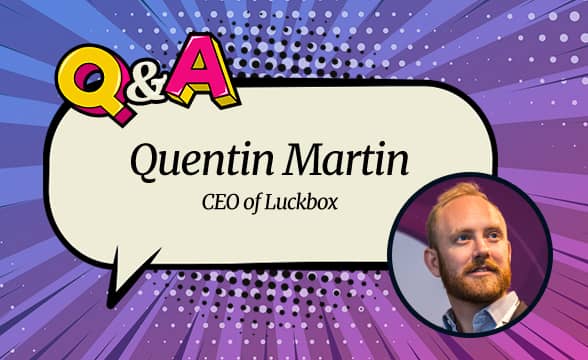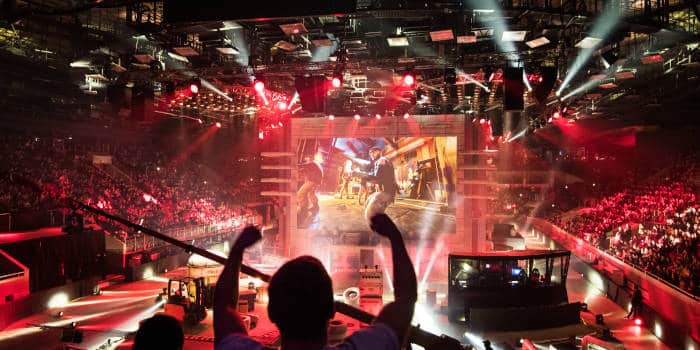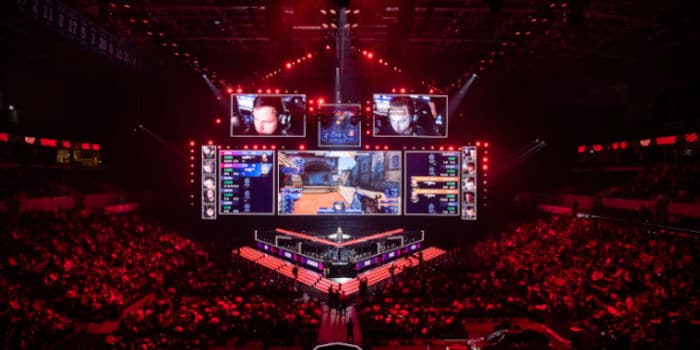- Casino
- By State
- Alabama
- Alaska
- Arizona
- Arkansas
- California
- Colorado
- Connecticut
- Delaware
- Georgia
- Florida
- Hawaii
- Idaho
- Illinois
- Indiana
- Iowa
- Kansas
- Kentucky
- Louisiana
- Maine
- Massachusetts
- Maryland
- Michigan
- Minnesota
- Mississippi
- Missouri
- Montana
- Nebraska
- Nevada
- New Hampshire
- New Jersey
- New Mexico
- New York
- North Carolina
- North Dakota
- Ohio
- Oklahoma
- Oregon
- Pennsylvania
- Rhode Island
- South Carolina
- South Dakota
- Tennessee
- Texas
- Utah
- Vermont
- Virginia
- Washington
- West Virginia
- Wisconsin
- Wyoming
- By State
- Slots
- Poker
- Sports
- Esports
Luckbox CEO Quentin Martin on How Luckbox is Gearing up to Build on a Phenomenal 2020

Thank you, Quentin, for agreeing to do this Q&A with us.
I will start with something that has made an impression on me personally when it comes to esports. Back in 2016, I believe, Catena Media had a website the name of which I cannot quite recall, but it was on the lines of “esportsbettingreport.”
Just before the website was merged with The Lines (if I am not again mistaken) – presumably because of lack of interest in the domain – I read an article that only a very small percentage of traditional sportsbooks actually turned a profit on esports whereas the rest used it as a conversion tool to bring esports players to traditional sports
I find this an interesting point of entry for our discussion.
Q: Given the slow start esports betting was off to, at least back in 2016, how did Luckbox bring itself, as an organization, to dive in the sector and embrace it? Were their qualms about the potential success of the project or was it a sure game from the start?
We’ve never been in any doubt about the potential of esports betting. It’s not something we pivoted into, it was what Luckbox was born to do. I’d argue that, in 2016 esports betting was already big – it just wasn’t very well surfaced. In the most part it was because many sites at that time weren’t licensed and were operating illegally. Gradually, as the size of the market and the size of the potential market became more well-known, that’s when we started to see the licensed, more well-known operators move into the space.
Q: Circling back to what many sportsbooks were hoping to achieve by converting gamers into sports bettors, has the reversed happened? For example, have you seen an increase in betting handle towards sports simulators such as FIFA and NBA2K?
Earlier in 2020, during the first Covid-enforced lockdown, this was certainly a trend we spotted. With almost all sports put on hold across the globe, esports was the only show in town. At that time, we didn’t offer FIFA and NBA2K betting, since these are not deemed prime esports, but we recognised there was suddenly a big uptick in demand for those games so we reacted quickly to add them to our site.
Q: The pandemic has sent a lot of traffic from traditional sportsbooks to esports. How has that benefited Luckbox? Have you been able to scale up your operations and do you see more traditional sports bettors giving video games a shot?
It did benefit us, yes. We saw an increase of more than 500% in turnover during the pandemic and much of that was sports bettors coming to our site due to a lack of action across the globe. I’m happy to say that we managed to lock up about 75% of the gains we made during that time, so it seems that, indeed, most sports bettors enjoy betting on esports too.
Q: Do you feel the pandemic has negatively impacted Luckbox mostly due to the cancellation and delay of events that would have traditionally be taking place by now, i.e. the Dota Pro Circuit and The International for example.
Yes, some negative impact, but there’s no doubt it’s a net positive. Esports was lucky in that many events were able to shift online. We saw that with ESL One Cologne, for example. However, it’s never going to be as thrilling without the crowd there and Dota in particular seems to have suffered. The lack of TI this year was a blow, for sure. That said, the League of Legends World Championship went ahead as a LAN in China and it was great to see live esports in an arena again. Hopefully we can get back to that for all games as soon as possible.
Q: Luckbox has attracted interest from prominent investors such as Luis Robles and raised double the amount you expected to in a public funding round earlier this year. How will those funds help you scale and improve your operations?
The funds help on a few fronts, not least marketing. Our growth so far has been almost entirely organic – we’ve spent very little on marketing. This will change over the next year and we’ll have the resources to put Luckbox in front of millions of esports fans to acquire new players.
Secondly, it gives us the opportunity to look into mergers and acquisitions, to partner with companies that provide services we don’t already have in-house and this strengthens our position as a B2B provider.
Q: Is there a natural stopping point when it comes to the type of product you can offer to esports fans?
One of the reasons we decided to build Luckbox from scratch is because we believe esports fans expect a different type of product. Many sportsbooks look like little more than a spreadsheet, whereas Luckbox is designed to feel intuitive for gamers. This is what sets us apart from the established sportsbooks and one of the reasons we’re making sure we’re an attractive B2B proposition for those industry giants.
Q: What are your thoughts on the integrity of esports? The Esports Integrity Commission (ESIC) recently banned a slew of players who were abusing the competitive structure. Some were reinstated but the community grumbled it wasn’t fair. This particular case aside, do you reckon esports is going to have a wide-spread match-fixing incidence?
Esports has had its fair share of scandals but then so has sports. I believe things are getting better in esports and bodies such as ESIC are playing a pivotal role in that. It’s often perceived that these problems wouldn’t exist without bookmakers but in fact it’s often the bookies who are first to detect and report incidents of match-fixing and corruption.
Q: Do you think traditional sportsbooks and the gambling sector at large will seek closer ties with start-ups such as Luckbox? We are mostly thinking that esports could prove a way for traditional companies to adapt and tap into a younger audience. Does this make sense to you or are sports, poker and casinos worlds apart from esports?
We certainly think so, hence the aim of Luckbox becoming a B2B solution. Already, esports is more popular than some sports with younger demographics and there’s no ignoring that. Betting companies will be foolish to not offer a competitive esports betting service. Esports will become the #1 acquisition channel of traditional gambling companies in the future. The esports audience have different needs, use different media, and need to be treated differently and authentically – these challenges are part of the value proposition that Luckbox represents to the more traditional companies.
Q: Do you see technologies such as Artificial Intelligence boosting esports betting and how? We suppose embracing AI would help with CRM and tracking riskier behavior, as well as help spot match-fixing. What is your and Luckbox’s take on this?
As someone personally very bullish on AI, I couldn’t agree more. Wherever there is a large pool of data and a need for quick, complex calculations, it can add value. For esports betting, the odds compilation themselves can benefit from machine learning, as it can for real-time CRM, the identification of match-fixing, and aid responsible gaming efforts. I expect AI will have a huge part to play across almost all parts of the business at some stage.
Q: Assuming AI helps create great odds from a business standpoint, what would be esports bettors’ incentive to place bets on outcomes that are determined with near-perfect accuracy by a machine?
We’ll always want to offer competitive odds. So while AI could help us from a risk-management point of view, we’ll always endeavour to make sure the odds are attractive to players. That said, traditional sports odds can also be derived by AI; though, more importantly, odds are still the best predictions we have – as recent events can show, forecasting is a tricky business. Betting should be fun, challenging and rewarding.
Q: Do you reckon the entire institution of betting would have to change to accommodate esports bettors? As in, would it come down to “skill betting,” as Unikrn, suggests, or is it more to do with creating a transparent structure?
I think it’s true that there’s still a lot of work to do in educating esports fans about betting. Among football fans, for example, betting or at least betting talk is almost second-nature and that’s not the case in esports. Again, though, that’s why we built Luckbox from scratch – to make it feel intuitive and more like a game.
Skill betting or P2P betting is certainly interesting but watching esports is more popular than playing and, just like tennis or football, people will always want to watch and bet on the professionals.
Q: Speaking with affiliates, most companies have reported a small return and interest in esports betting. Do you reckon the niche is already carved up by the big companies and that is why smaller entities are struggling to see meaningful returns?
Esports affiliates have a big future, I believe. Many successful existing affiliate sites are dedicated to sports betting and, just like the traditional operators have seen, you’re targeting a very different audience. Esports fans are younger, more tech-savvy and are reachable through different channels. The affiliates who adapt to that quickest will be the most successful in esports.
Thank you for allowing us the opportunity to have this exchange with you.
Related Topics:
Mike made his mark on the industry at a young age, consulting for companies that would later become regulators. As one of the lead editor of Gambling News, he dedicates his weekdays to this project, aiming to educate the masses on the latest developments in the gambling circuit. His expertise and passion for the industry make him an invaluable asset to our team.
Must Read
Insider
May 15, 2025
Joshua Gamble: “Cross-sell is dead. What next?”
More Articles







Esports
May 6, 2025
Coolbet Boosts Esports Coverage with Oddin.gg

Esports
February 24, 2025
New Jersey May Allow Pro Esports Players to Bet on Themselves

Esports
February 10, 2025
League of Legends Developer Sued in Belgium over Loot Boxes

Esports
January 20, 2025
Riot Games to Allow LoL and VALORANT Sportsbook Sponsorships

Esports
January 15, 2025
PandaScore Introduces Cutting-Edge StoryBuilder Product

Esports
December 30, 2024
Coffeezilla Critiques Valve’s Relationship with Gambling









